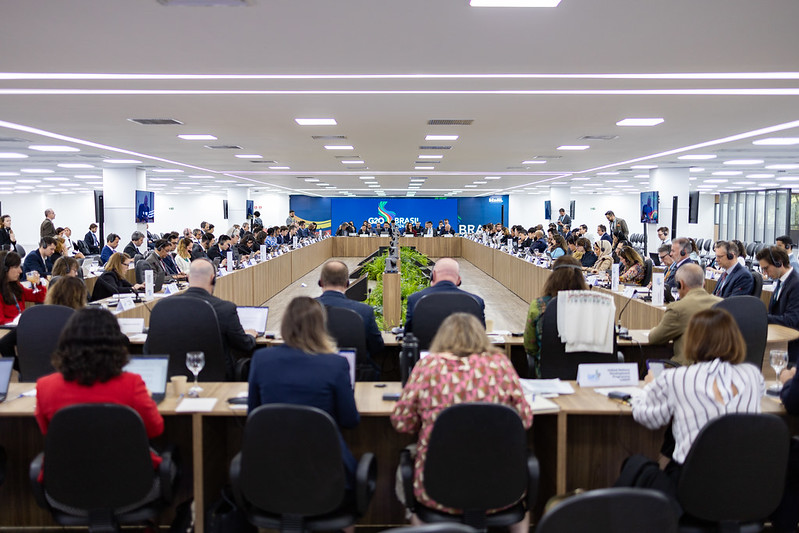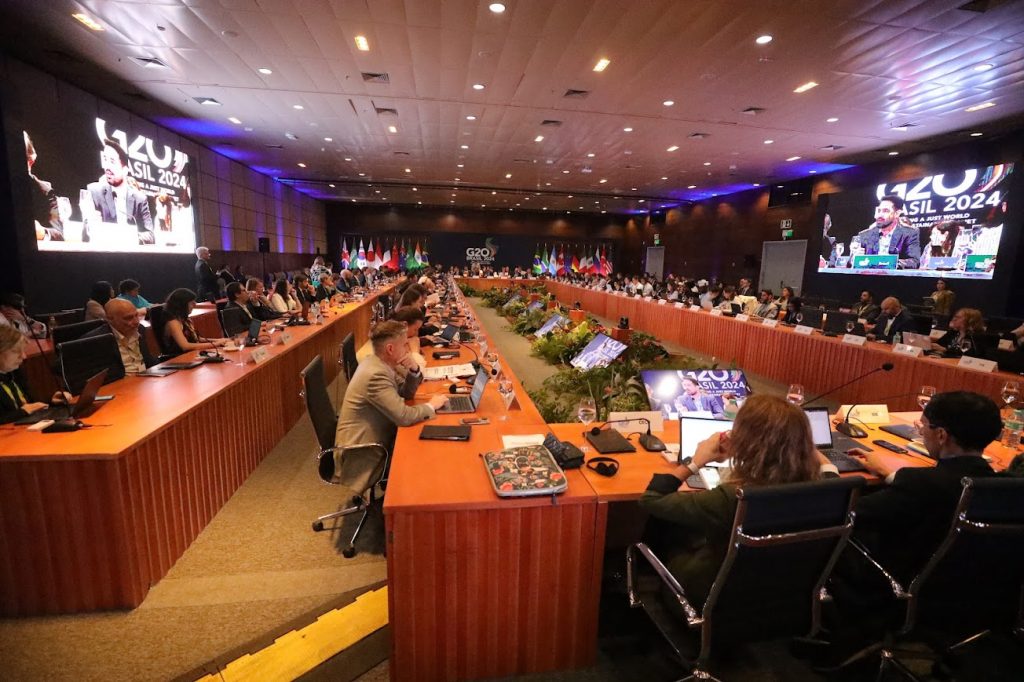As we are gearing up for the final G20 Sustainable Finance Working Group (SFWG) meeting in Rio, we are pleased to report on the progress made during the second and third G20 SFWG meetings, the input papers received in 2024 and the G20 Sustainable Finance Roadmap Progress Tracking.
The SFWG 2024 priorities focus on crucial areas that address both global and local challenges, especially for the Global South. These include:
- Optimizing the operations of the International Environmental and Climate Funds to deliver sustainable finance.
- Advancing credible, robust, and just transition plans.
- Analyzing implementation challenges related to sustainability reporting standards, including for SMEs and EMDEs.
- Financing Nature-Based Solutions.

The second G20 SFWG meeting in Brasília underscored the critical importance of concessional finance for biodiversity and climate projects in low- and middle-income countries. Discussions included optimizing climate finance architecture and enhancing the synergy among the main climate funds. Key points involved balancing macro and micro elements of fund operations and mobilizing both public and private sector contributions. The meeting also focused on developing high-level principles for just transition plans and ensuring that transition plans are credible and inclusive.

The third SFWG meeting convened in Belém on July 9th and 10th 2024, and emphasized the progress made on the journey towards innovative and optimized sustainable finance mechanisms. With lively discussions on just transition plans and robust recommendations, the meeting set a dynamic course for future progress.
The full meeting summaries can be read at the document repository as they become available.
The Road to G20: Side Events to Inform G20 SFWG Workplan
Between the first and the third SFWG meetings, several side events were organized for SFWG members, including the Sustainable Finance Private Sector Roundtable, and two virtual workshops: “How Can the G20 Support High-Integrity Carbon Markets?” and “Webinar on Analyzing Sustainability Disclosures Reporting with a Focus on SMEs and Firms in EMDEs”.
Additionally, in partnership with the G20 and the Financial Centres for Sustainability (FC4S) Network. National Private Sector Roundtables were held in Brazil, Mexico and India. They provided a space for national governmental entities and regulators to discuss the 2024 G20 SFWG agenda with national financial institutions and corporates.
Read all the meeting summaries as they become available here.
Summer Reading List: G20 SFWG Input Papers
Over the past few months, we’ve seen an influx of input papers from a diverse array of knowledge partners. These contributions provide valuable insights into the four SFWG priorities, shaping the G20 2024 Sustainable Finance Report and the SFWG recommendations for the year. Impressively, we have received over twenty high-quality input papers.
We thank all the knowledge partners for their valuable contributions, effort, and commitment to the SFWG work and advancing sustainable finance. Without further ado, find below your G20 SFWG summer reading list.

Priority 1 – Optimizing the operations of the International Environmental and Climate Funds to deliver sustainable finance
Optimizing the operations of International Environmental and Climate Funds is crucial to ensure efficient and impactful use of resources. These funds play a pivotal role in supporting climate action and biodiversity protection in developing countries. Streamlining access and enhancing collaboration can significantly amplify their impact.
Input papers:

Priority 2 – Advancing credible, robust, and just transition plans
Transitioning to low or net-zero emissions requires comprehensive and equitable plans. These plans must address potential economic and social impacts, ensuring no one is left behind. Developing high-level principles and fostering a just transition are key steps towards sustainable development.
Input papers:
- The Role of Policymakers in Mobilising Private Finance to Ensure a Credible and Just Transition in Steel and Cement (CBI)
- Key considerations for G20 Principles for Transition Planning (GFANZ Secretariat)
- The Potential of Financial Mechanisms for a Just Transition: An Analysis of Challenges and Initiatives in the G20 LAC Countries (IDB)
- Advancing Credible and Robust Just Transition Plans (IEEFA)
- Enhancing the Social Dimension in Transition Finance – Towards a Just Transition (ILO)
- Advancing Robust, Credible, and Just Transition Plans (OECD)
- Opportunities and Challenges Relating to the Use of Private Sector Transition Plans in EMDEs (TPT)
- Sustainability Crossroads: Where Climate and Nature Meet Equity (UNDP)
- Incorporating Just Transition Considerations into Financial Sector Transition Planning (UNEP FI, ILO)
- How Finance Can Unlock Credible, Robust, and Just Transition Plans (WBA, LSE, GRI)
- Key Findings – How Finance Can Unlock Credible, Robust, and Just Transition Plans (WBA, LSE, GRI)

Priority 3 – Analyzing implementation challenges related to sustainability reporting standards, including for SMEs and EMDEs
Effective sustainability reporting is essential for transparency and accountability. However, SMEs and firms in EMDEs often face unique challenges. Addressing these challenges will help integrate these firms into global value chains and promote inclusive growth.
Input papers:
- Impact of Environmental Regulation on Supply Chain Disclosure (CDP)
- Input paper for the SFWG G20 Brazilian Presidency (EFRAG)
- Sustainability Reporting in the Digital Age: Overcoming Challenges for SMEs and EMDEs (ICS, FGV, ITS)
- Making Sustainability Disclosure Standards Work for All (GSG Impact)
- White Paper on Project Savannah: Common ESG Metrics for Generating Digital Sustainability Credentials for MSMEs (MAS, UNDP, GLEIF)
- Implementing Sustainability Reporting that Works for SMEs (OECD)
- Shaping the Future of SME Sustainability Disclosure: A Holistic Approach (UNCTAD)
- Recommendations from Voluntary Nature-Related Reporting Frameworks (UNEP FI)
- Sustainability Reporting Standards: Overview of the Ongoing Implementation Process and Recommendations on the Way Forward (WB, IFRS, IOSCO)

Priority 4 – Financing Nature-Based Solutions
Nature-Based Solutions (NbS) offer multifaceted benefits for climate resilience and biodiversity. Scaling up financing for NbS through innovative financial instruments is vital. These efforts will help meet global targets for nature and climate.
Input papers:
- Natural Capital: Valuing Nature in Policy and Finance (Stanford Natural Capital Project)
- Recommendations for Scaling Finance for NbS (UNEP FI)

Tracking progress on the G20 Sustainable Finance Roadmap
The online Progress Tracking Dashboard continues to efficiently monitor the latest progress over the 19 Actions of the G20 Sustainable Finance Roadmap. The dashboard is based on efforts voluntarily reported by jurisdictions, international organizations, and global networks to advance the 5 Roadmap’s focus areas of action.
With active voluntary contributions from all G20 jurisdictions, this tracker highlights progress in sustainable development, emphasizing the collective drive towards sustainable finance.
The Road to G20: SFWG Upcoming Events
On the road to the G20 Summit, we have one more crucial SFWG meeting scheduled to be held in Rio de Janeiro in September, along with a side event on Technical Assistance Action Plan (TAAP). Stay tuned for more updates as we continue our journey toward sustainable finance and a just, inclusive, and resilient world.
Thank you for your continued support and engagement. For more information on the G20 SFWG, make sure to explore the website.
